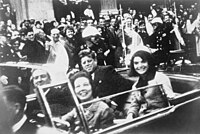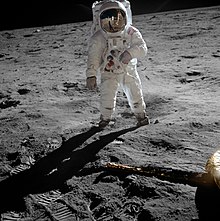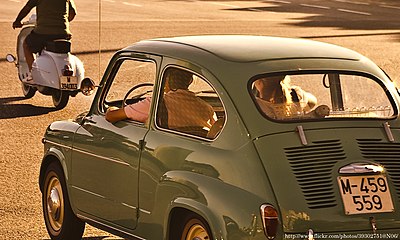The 1960s Portal
The 1960s became synonymous with the new, radical, and subversive events and trends of the period. In Africa the 1960s was a period of radical political change as 32 countries gained independence from their European colonial rulers. Some commentators have seen in this era a classical Jungian nightmare cycle, where a rigid culture, unable to contain the demands for greater individual freedom, broke free of the social constraints of the previous age through extreme deviation from the norm. Christopher Booker charts the rise, success, fall/nightmare and explosion in the London scene of the 1960s. However, this alone does not explain the mass nature of the phenomenon. Several nations such as the U.S., France, Germany and Britain turned to the left in the early and mid 1960s. In the United States, John F. Kennedy, a Keynesian and staunch anti-communist, pushed for social reforms. His assassination in 1963 was a stunning shock. Liberal reforms were finally passed under Lyndon B. Johnson including civil rights for African Americans and healthcare for the elderly and the poor. Despite his large-scale Great Society programs, Johnson was increasingly reviled by the New Left at home and abroad. The heavy-handed American role in the Vietnam War outraged student protestors across the globe, as they found peasant rebellion typified by Ho Chi Minh and Che Guevara more appealing. Italy formed its first left-of-center government in March 1962 with a coalition of Christian Democrats, Social Democrats, and moderate Republicans. Socialists joined the ruling block in December 1963. In Britain, the Labour Party gained power in 1964. In Brazil, João Goulart became president after Jânio Quadros resigned. This is a Featured article, which represents some of the best content on English Wikipedia..
Apollo 11 was a spaceflight conducted by the United States from July 16 to July 24, 1969. It marked the first time in history that humans landed on the Moon. Commander Neil Armstrong and Lunar Module Pilot Buzz Aldrin landed the Apollo Lunar Module Eagle on July 20, 1969, at 20:17 UTC, and Armstrong became the first person to step onto the Moon's surface six hours and 39 minutes later, on July 21 at 02:56 UTC. Aldrin joined him 19 minutes later, and they spent about two and a quarter hours together exploring the site they had named Tranquility Base upon landing. Armstrong and Aldrin collected 47.5 pounds (21.5 kg) of lunar material to bring back to Earth as pilot Michael Collins flew the Command Module Columbia in lunar orbit, and were on the Moon's surface for 21 hours, 36 minutes, before lifting off to rejoin Columbia. Apollo 11 was launched by a Saturn V rocket from Kennedy Space Center on Merritt Island, Florida, on July 16 at 13:32 UTC, and it was the fifth crewed mission of NASA's Apollo program. The Apollo spacecraft had three parts: a command module (CM) with a cabin for the three astronauts, the only part that returned to Earth; a service module (SM), which supported the command module with propulsion, electrical power, oxygen, and water; and a lunar module (LM) that had two stages—a descent stage for landing on the Moon and an ascent stage to place the astronauts back into lunar orbit. (Full article...) This is a Good article, an article that meets a core set of high editorial standards.
Led Zeppelin were an English rock band formed in London in 1968. The band comprised Robert Plant (vocals), Jimmy Page (guitar), John Paul Jones (bass and keyboards) and John Bonham (drums). With a heavy, guitar-driven sound and drawing from influences including blues and folk music, Led Zeppelin are cited as a progenitor of hard rock and heavy metal. They significantly influenced the music industry, particularly in the development of album-oriented rock and stadium rock. Led Zeppelin evolved from a previous band, the Yardbirds, and were originally named the New Yardbirds. They signed a deal with Atlantic Records that gave them considerable artistic freedom. Initially unpopular with critics, they achieved significant commercial success with eight studio albums over ten years. Their 1969 debut, Led Zeppelin, was a top-ten album in several countries and features such tracks as "Good Times Bad Times", "Dazed and Confused" and "Communication Breakdown". Led Zeppelin II (1969), their first number-one album, includes "Whole Lotta Love" and "Ramble On". In 1970, they released Led Zeppelin III which opens with "Immigrant Song". Their untitled fourth album, commonly known as Led Zeppelin IV (1971), is one of the best-selling albums in history, with 37 million copies sold. It includes "Black Dog", "Rock and Roll" and "Stairway to Heaven", with the latter being among the most popular and influential works in rock. Houses of the Holy (1973) includes "The Song Remains the Same" and "Over the Hills and Far Away". Physical Graffiti (1975), a double album, features "The Rover" and "Kashmir". (Full article...) Selected picture -Did you know -
Related portalsThis is a Featured article, which represents some of the best content on English Wikipedia..
James Marshall "Jimi" Hendrix (born Johnny Allen Hendrix; November 27, 1942 – September 18, 1970) was an American guitarist, songwriter and singer. He is widely regarded as the greatest guitarist in the history of popular music and one of the most influential musicians of the 20th century. The Rock and Roll Hall of Fame describes him as "arguably the greatest instrumentalist in the history of rock music." Born in Seattle, Washington, Hendrix began playing guitar at age 15. In 1961, he enlisted in the US Army, but was discharged the following year. Soon afterward, he moved to Clarksville, then Nashville, Tennessee, and began playing gigs on the chitlin' circuit, earning a place in the Isley Brothers' backing band and later with Little Richard, with whom he continued to work through mid-1965. He then played with Curtis Knight and the Squires before moving to England in late 1966 after bassist Chas Chandler of the Animals became his manager. Within months, Hendrix had earned three UK top ten hits with his band, the Jimi Hendrix Experience (with its rhythm section consisting of bassist Noel Redding and drummer Mitch Mitchell): "Hey Joe", "Purple Haze", and "The Wind Cries Mary". He achieved fame in the US after his performance at the Monterey Pop Festival in 1967, and in 1968 his third and final studio album, Electric Ladyland, reached number one on the US Billboard 200. The double LP was Hendrix's most commercially successful release and his only number one album. The world's highest-paid rock musician, he headlined the Woodstock Festival in 1969 and the Isle of Wight Festival in 1970 before his accidental death in London from barbiturate-related asphyxia in September 1970. (Full article...) This is a Good article, an article that meets a core set of high editorial standards.
Sir Michael Philip Jagger (born 26 July 1943) is an English musician. He is best known as the lead singer and one of the founder members of the Rolling Stones. Jagger has co-written most of the band's songs with lead guitarist Keith Richards; their songwriting partnership is one of the most successful in rock music history. His career has spanned over six decades, and he has been widely described as one of the most popular and influential front men in the history of rock music. His distinctive voice and energetic live performances, along with Richards' guitar style, have been the Rolling Stones' trademark throughout the band's career. Early in his career, Jagger gained notoriety for his romantic involvements and illicit drug use, and has often been portrayed as a countercultural figure. Jagger was born and grew up in Dartford. He studied at the London School of Economics before abandoning his studies to focus on his career with the Rolling Stones. In the late 1960s, Jagger starred in the films Performance (1970) and Ned Kelly (1970), to mixed receptions. Beginning in the 1980s, he released a number of solo works, including four albums and the single "Dancing in the Street", a 1985 duet with David Bowie that reached No. 1 in the UK and Australia and was a top-ten hit in other countries. (Full article...) Selected article -In the late 1960s, Latin jazz, combining rhythms from African and Latin American countries, often played on instruments such as conga, timbale, güiro, and claves, with jazz and classical harmonies played on typical jazz instruments (piano, double bass, etc.) broke through. There are two main varieties: Afro-Cuban jazz was played in the US right after the bebop period, while Brazilian jazz became more popular in the 1960s. Afro-Cuban jazz began as a movement in the mid-1950s as bebop musicians such as Dizzy Gillespie and Billy Taylor started Afro-Cuban bands influenced by such Cuban and Puerto Rican musicians as Xavier Cugat, Tito Puente, and Arturo Sandoval. Brazilian jazz such as bossa nova is derived from samba, with influences from jazz and other 20th-century classical and popular music styles. Bossa is generally moderately paced, with melodies sung in Portuguese or English. The style was pioneered by Brazilians João Gilberto and Antônio Carlos Jobim. The related term jazz-samba describes an adaptation of bossa nova compositions to the jazz idiom by American performers such as Stan Getz and Charlie Byrd. Bossa nova was made popular by Elizete Cardoso's recording of Chega de Saudade on the Canção do Amor Demais LP, composed by Vinícius de Moraes (lyrics) and Antonio Carlos Jobim (music). The initial releases by Gilberto and the 1959 film Black Orpheus brought significant popularity in Brazil and elsewhere in Latin America, which spread to North America via visiting American jazz musicians. The resulting recordings by Charlie Byrd and Stan Getz cemented its popularity and led to a worldwide boom with 1963's Getz/Gilberto, numerous recordings by famous jazz performers such as Ella Fitzgerald (Ella Abraça Jobim) and Frank Sinatra (Francis Albert Sinatra & Antônio Carlos Jobim), and the entrenchment of the bossa nova style as a lasting influence in world music for several decades and even up to the present. (Full article...) More Did you know (auto generated)
TopicsCategoriesWikiProjects
Associated WikimediaThe following Wikimedia Foundation sister projects provide more on this subject:
Discover Wikipedia using portals |






























